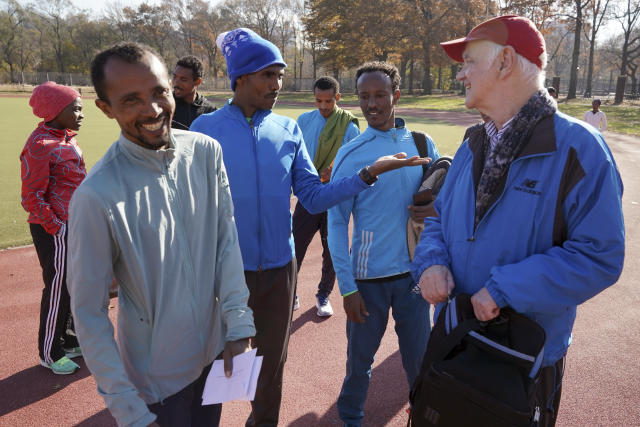NY team helping immigrant runners realize American dream

NEW YORK (AP) — A no-name entrant at this month’s New York City Marathon — literally, he didn’t even qualify to have his name printed on his bib — Girma Bekele Gebre crashed the elite field and finished third in the largest 26.2-mile race in the world.
A week later, the Ethiopian runner sat in Bill Staab’s Upper West Side apartment, smiling and nodding while Staab recounted details from his stunning podium finish.
“It’s a life-changer,” Staab said. Staab, the 80-year-old president of the West Side Runners’ Club, has helped numerous careers during his 42-year term, making the American dream possible for immigrants from all over. A longtime running enthusiast who is retired from his career in steel sales and administration, Staab has become an indispensable organizer for runners from South America and Africa. He’s written hundreds of letters to support visa-seeking athletes, and he says he’s spent nearly $1 million of his own money on entry fees and memberships for West Side runners like Girma.
He doesn’t pocket the winnings — like the $61,000 earned by Girma, or the $10,000 that countryman Diriba Degefa Yigezu got for winning last weekend’s Philadelphia Marathon. Staab helps the athletes cash those checks and use the money to fund their travels or support others back home.
“When I came here, I didn’t have any family,” Diriba said. “This person helped me. That’s why I run for him.”
Girma’s success is a new level for West Side Runners. Prior to his breakthrough, he was “just another one of our runners,” Staab said — one of his “basically minor league racers.” Girma came to the U.S for three to four months at a time, and Staab would arrange near-weekly races for him across the country. He’d make $500 here, $1,000 there — his biggest payday was $8,000 — and he would send some of that back to his family, which is helping raise his 4-year-old daughter on their farm.
The routine was interrupted this year when one of Girma’s six brothers died. He cut short his spring U.S. trip and returned to Ethiopia. Instead of grinding through half-marathons and 10Ks, he trained at altitude in the Ethiopian capital of Addis Ababa.
New York was Girma’s first race back in the U.S., and he posted a stunning time of 2 hours, 8 minutes, 38 seconds — more than five minutes faster than his previous personal best.
“If he had said, ‘I’m going to run 2:08,’ I would have said, ‘That’s crazy,’” Staab said. Girma is thinking about putting the prize money into a house in Ethiopia. He’s been contacted by agents and sponsors about potential deals, and Staab is hopeful Girma will be approved for a green card — an important step up from his P1 athlete visa that will make living and competing in the U.S. easier. He’s eyeing the Boston Marathon for his next race, although it’s uncertain if he’ll crack the smaller field there. For now, he plans to spend time back home weighing his options. Among his goals: he wants to shave another few minutes off his personal best marathon time.







